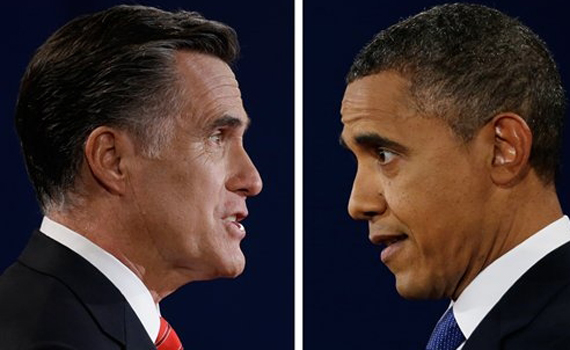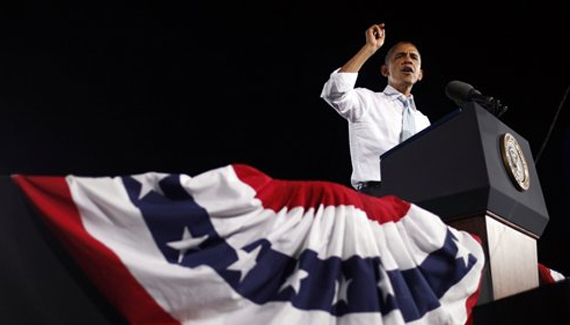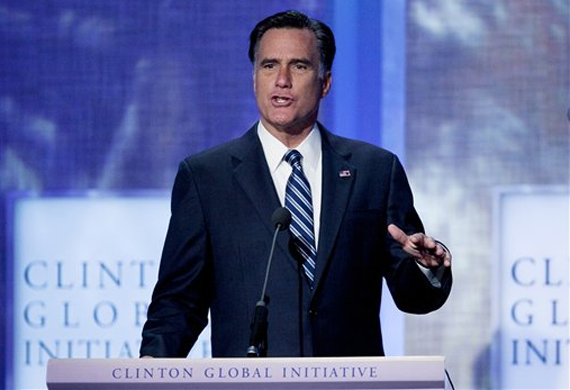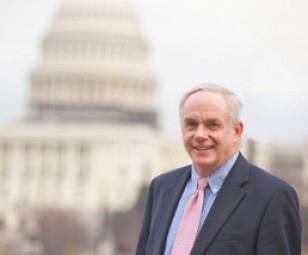
Vice President Joe Biden (R) and Republican challenger Paul Ryan (L) pass each other after their debate in Danville, Kentucky, Oct. 11, 2012. Photo: AP
Trying to Right the Democratic Ship
Democrats are feeling better after Thursday’s vice presidential debate and many are now singing the praises of that old liberal warhorse, Vice President Joe Biden. Make no mistake about it; this was a big moment for the Democrats. So many of President Barack Obama’s supporters sank into the dumps after last week’s presidential debate that there were real concerns that the president’s lackluster performance against Republican challenger Mitt Romney might depress Democratic turnout at the polls on Election Day.
Democrats were looking for a boost but were a little uncertain which Joe Biden would show up to the debate—the razor sharp debater who can dominate, or the gaffe-prone goofy uncle who can get himself into trouble. Democrats were much relieved when it was the former.
Ryan’s National Debut

President Obama, shown here at a campaign event in the Miami, Florida area Oct. 11, 2012, is hoping for a strong showing in his second debate with Republican Mitt Romney on Tuesday. Photo: AP
Paul Ryan did a credible job Thursday and kept his cool even though he was constantly interrupted and at times mocked by Joe Biden. Most Republicans pronounced themselves satisfied with his low-key, “just the facts, ma’am” approach as he tried to fend off a relentless Biden, who seemed determined to channel all that Democratic angst over Mr. Obama’s showing in the first debate into an all-out attack on the Romney-Biden ticket.
Ryan did get hammered a bit when he criticized the administration’s emphasis on creating so-called “green jobs” in the environmental sector as part of the economic stimulus effort. Biden quickly reminded Ryan he had written letters asking for help on behalf of constituents in his home state of Wisconsin who wanted some of that money to go to them. It turned out to be one of those “gotcha” moments that politicians love to dish on. It was one of the few times during the debate when Ryan didn’t quite seem to be in Biden’s league.
When Ryan was picked to be on the ticket some ardent conservatives hoped it signaled a willingness on the Romney team to have a big philosophical debate about the role of government. The conservatives were especially anxious to talk about what they see as the need to reform social entitlement programs like Medicare, Medicaid and Social Security, which many Republicans consider examples of Americans having become too dependent on government help.
But so far the big debate has not materialized and while that has disappointed, some conservative activists will probably get over it if the Romney-Ryan ticket can pull out a victory on November 6th presidential elections.
Foreign Policy Front and Center
The vice presidential debate took a strong turn into foreign policy issues, with full discussions of the fallout from the attack on the U.S. consulate in Libya, what to do about Iran’s nuclear ambitions, how to handle the civil war in Syria and how to wrap up the U.S. military involvement in Afghanistan.
On Libya, Biden doubled down on the notion that the administration was not aware of the pleas for additional security before the terrorist attack that killed Ambassador Chris Stevens and three other Americans. But a congressional hearing the day before suggested there were appeals for more help and this issue could dog the Obama-Biden ticket a bit more in the days to come. Still it should also be said that it’s not likely that events in Libya will determine the outcome of the U.S. election.
Biden offered more pushback on the Romney-Ryan charges that the U.S. has been too soft on Iran in trying to check its nuclear program and has not done enough to help the opponents of the government in Syria. Biden kept hinting that the tough talk from the Romney team could make U.S. military involvement more likely in both places, something Ryan scoffed at.
But the Biden strategy was clear: Americans are war-weary after Afghanistan and Iraq. Most people want to focus on issues at home. And the notion of gearing up for another big military involvement in the Middle East is pretty unappetizing.
And again on Afghanistan, it was not clear exactly what differences the Romney camp has with the Obama approach. Biden kept hammering on the idea that it’s time for the Afghans to step up and handle their own security, and reminding that the U.S. combat troops are leaving in 2014 as promised. Ryan seemed to quibble about how U.S. forces are being phased down, but also acknowledged at one point that the Republican ticket agrees with the administration’s transition timeline of withdrawing by 2014.
Historically Little Impact

The late Sen. Lloyd Bentsen (L) may have defeated Republican Dan Quayle (R) in their vice presidential debate Oct, 5, 1988, but Quayle and presidential candidate George H.W. Bush went on to defeat the Democrats in the general election. Photo: AP
But let’s be honest. Historically, vice presidential debates have meant little in the grand scheme of presidential politics. One of the most withering lines delivered in any debate was Democrat Lloyd Bentsen’s retort to Republican Dan Quayle in the 1988 vice presidential debate. Quayle invoked the memory of John F. Kennedy in trying to fend off concerns about his youth and relative inexperience. Bentsen pounced, wielding the debating equivalent of a light saber. “Senator, I served with Jack Kennedy. I knew Jack Kennedy. Jack Kennedy was a friend of mine.” (Pause here for dramatic effect) “Senator, you’re no Jack Kennedy.” Whoops and hollers from the audience and a clean kill, as they say in the business. But in the end, the Bush-Quayle ticket still coasted to victory over Dukakis-Bentsen, a prime example of why vice presidential debates tend to have little impact on the outcome.
Four years ago, the bar was set so low for Republican candidate Sarah Palin in her debate with Joe Biden that many analysts called the showdown a draw just because she was able to show up and hold her own. The decision of Republican presidential candidate John McCain to tap Palin to join the ticket paid some initial dividends by firing up the conservative base at their national convention. But ultimately, it became a distracting sideshow for the Republicans once Palin became the target of television comedy shows like “Saturday Night Live.”
Political Redemption
Palin, Quayle and, to a lesser, extent Al Gore are examples of politicians who became punch lines for late night comedians. That can turn into the kiss of death for them.
One exception to that rule is former President Bill Clinton. His extra-marital affair while in office propelled him into the stratosphere of comedy targets in the late 1990s. But Clinton was able to do something few national politicians are able to do—he eventually sought and gained forgiveness from the public for his transgressions and turned around his image. As a result, he remains today one of the most popular figures in either party. In that sense, Clinton is kind of the anti-Nixon. Both men had a fall from grace but handled it in different ways. Clinton was able to draw on a reserve of affection from the public that Richard Nixon never had, and in the end Clinton achieved a certain measure of redemption while Nixon never really did.
Obama-Romney Round Two

Republican presidential candidate Mitt Romney, shown speaking to a rally in Asheville, North Carolina, Oct. 11, can expect to face a tougher challenge from President Obama in their second debate Tuesday. Photo: AP
Next up is the second of the three presidential debates between the president and Mr. Romney, this one at Hofstra University in New York. Most experts are betting a different Barack Obama will show up to this debate — more engaged and more apt to tangle with his Republican opponent. Mr. Romney had an excellent first debate and it’s worth watching to see if he tries to continue his metamorphosis from “severe conservative” to “raging moderate” in this debate.
Most of the pressure, though, will be on President Obama to step up his game and take a cue from Joe Biden to be a bit more feisty and aggressive. No doubt this will be a key moment for the president in this campaign. His lackluster showing in the first debate cost him in the polls and race now looks about dead-even. Another poor performance or major gaffe in this debate could continue to shift things in Romney’s direction.
This second debate will adopt the town hall meeting format in which questions are posed by members of the audience. It’s hard to know which candidate that might favor. But Democrats are expecting a much better performance from the president and the pressure is on for him to deliver. It’s clearly shaping up as a key moment in the campaign. An incumbent president stumbling in a debate is nothing new, but you don’t want it to become a habit.
Mr. Romney also will be tested. He can expect to be challenged more in this debate and will be forced to defend some of his positions and statements, most notably the infamous comments from a secretly-recorded fundraising event earlier this year where he dismissed the 47 percent of people who support the president as government dependents who see themselves as victims. Biden got into that in his debate and we can expect more on this theme from the president in this next debate on Tuesday.

























